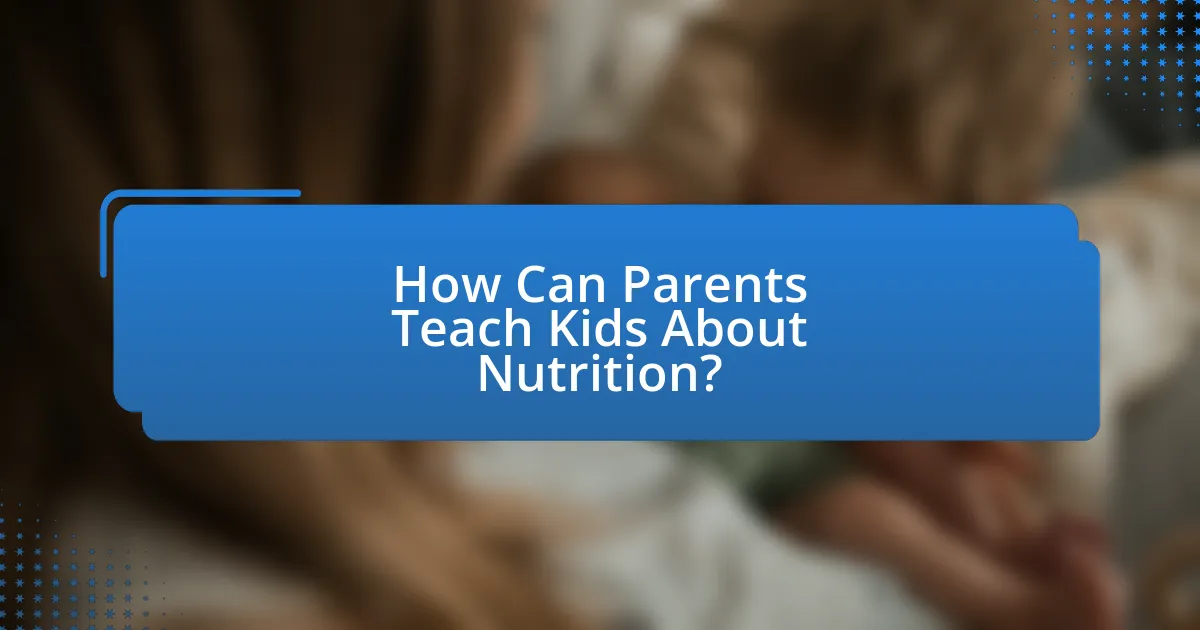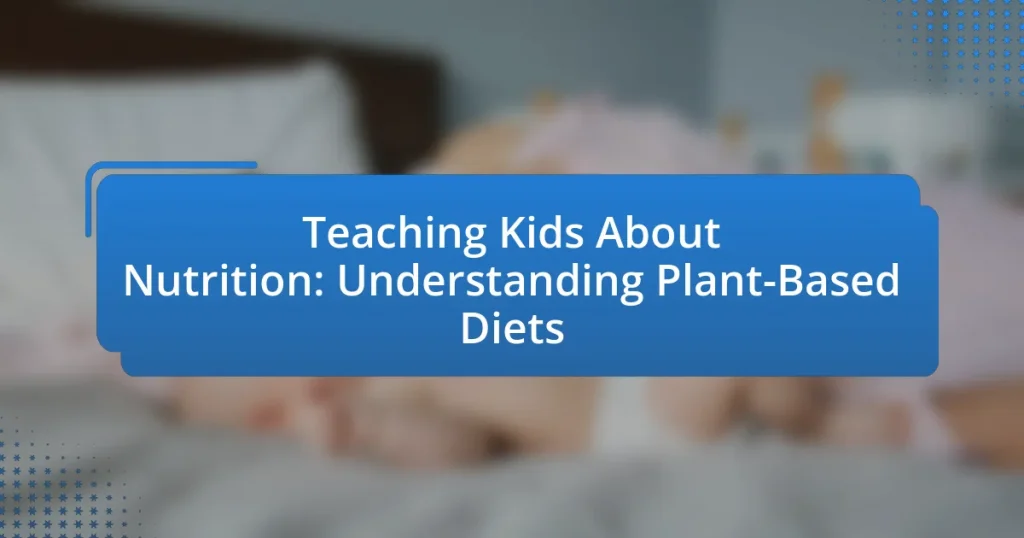The article focuses on the importance of nutrition for children, emphasizing the role of a balanced diet in their growth, development, and cognitive function. It outlines essential nutrients that children need, such as proteins, vitamins, and minerals, and discusses how proper nutrition can prevent childhood obesity and promote overall health. Additionally, the article explores the benefits of a plant-based diet, detailing its components, health advantages, and environmental impact. It provides practical strategies for parents to teach their children about nutrition, including engaging them in meal preparation and introducing plant-based foods in an appealing manner.

What is Nutrition and Why is it Important for Kids?
Nutrition is the process by which living organisms obtain and utilize food to support growth, development, and overall health. It is crucial for kids because proper nutrition provides essential nutrients that are vital for their physical and cognitive development. For instance, a balanced diet rich in vitamins, minerals, proteins, and healthy fats supports optimal growth, enhances immune function, and improves concentration and learning abilities. Research indicates that children who receive adequate nutrition are more likely to perform better academically and have lower risks of chronic diseases later in life.
How does nutrition impact a child’s growth and development?
Nutrition significantly impacts a child’s growth and development by providing essential nutrients necessary for physical and cognitive advancement. Adequate nutrition supports the formation of strong bones, muscles, and organs, while also influencing brain development and function. For instance, a study published in the Journal of Nutrition found that children who consume a balanced diet rich in fruits, vegetables, whole grains, and proteins exhibit better growth patterns and cognitive performance compared to those with poor dietary habits. Specifically, deficiencies in key nutrients like iron and omega-3 fatty acids can lead to stunted growth and developmental delays. Thus, proper nutrition is crucial for ensuring that children reach their full potential in both physical stature and intellectual capabilities.
What are the essential nutrients children need?
Children need essential nutrients including proteins, carbohydrates, fats, vitamins, and minerals for healthy growth and development. Proteins are crucial for building and repairing tissues, while carbohydrates provide energy for daily activities. Healthy fats support brain development and overall health. Vitamins, such as A, C, D, and B-complex, play vital roles in immune function, bone health, and energy metabolism. Minerals like calcium and iron are important for bone strength and oxygen transport in the blood. According to the Dietary Guidelines for Americans, a balanced diet rich in these nutrients is necessary for children to thrive and meet their developmental milestones.
How does a balanced diet support cognitive function in children?
A balanced diet supports cognitive function in children by providing essential nutrients that are critical for brain development and function. Nutrients such as omega-3 fatty acids, found in fish and flaxseeds, are vital for building brain cell membranes and enhancing cognitive performance. Additionally, vitamins and minerals like iron, zinc, and B vitamins, which are abundant in fruits, vegetables, whole grains, and legumes, play significant roles in neurotransmitter function and energy metabolism in the brain. Research indicates that children who consume a diet rich in these nutrients demonstrate improved memory, attention, and overall cognitive abilities, as evidenced by studies linking nutrient intake to academic performance and cognitive assessments.
What role does nutrition play in preventing childhood obesity?
Nutrition plays a critical role in preventing childhood obesity by providing essential nutrients that support healthy growth and development while regulating energy intake. A balanced diet rich in fruits, vegetables, whole grains, and lean proteins helps children maintain a healthy weight by promoting satiety and reducing the likelihood of overeating. Research indicates that children who consume a diet high in fiber and low in added sugars and saturated fats are less likely to become obese. For instance, a study published in the journal “Obesity” found that children who adhered to a plant-based diet had a significantly lower risk of obesity compared to those with a diet high in processed foods. This evidence underscores the importance of nutrition education in teaching children about healthy eating habits to combat obesity effectively.
How can parents identify healthy eating habits?
Parents can identify healthy eating habits by observing their children’s food choices, portion sizes, and overall dietary patterns. Healthy eating habits include a balanced intake of fruits, vegetables, whole grains, and lean proteins, while limiting processed foods, added sugars, and saturated fats. Research indicates that children who consume a variety of nutrient-dense foods are more likely to maintain a healthy weight and develop better eating habits over time. Additionally, parents can monitor their children’s reactions to different foods, noting preferences for whole foods over processed options, which is a strong indicator of healthy eating behavior.
What are the long-term effects of poor nutrition in childhood?
Poor nutrition in childhood can lead to long-term effects such as stunted growth, cognitive impairments, and increased risk of chronic diseases. Children who experience inadequate nutrition may not reach their full height potential, as evidenced by studies showing that malnutrition can result in a 20% reduction in growth rates. Additionally, poor dietary habits during formative years are linked to lower academic performance and difficulties in learning, with research indicating that deficiencies in essential nutrients like iron and omega-3 fatty acids can adversely affect brain development. Furthermore, individuals who had poor nutrition in childhood are at a higher risk of developing obesity, diabetes, and cardiovascular diseases later in life, with statistics revealing that childhood obesity often persists into adulthood, increasing the likelihood of these health issues.

What is a Plant-Based Diet?
A plant-based diet primarily consists of foods derived from plants, including fruits, vegetables, grains, nuts, seeds, and legumes, while minimizing or excluding animal products. This dietary approach emphasizes whole, minimally processed foods and is associated with various health benefits, such as reduced risk of chronic diseases like heart disease and diabetes. Research published in the Journal of the American Heart Association indicates that plant-based diets can lower blood pressure and cholesterol levels, supporting overall cardiovascular health.
How does a plant-based diet differ from other diets?
A plant-based diet primarily consists of foods derived from plants, including fruits, vegetables, grains, nuts, and seeds, while excluding or minimizing animal products. This diet differs from others, such as omnivorous or ketogenic diets, which include significant amounts of meat, dairy, and processed foods. Research indicates that plant-based diets are associated with lower risks of chronic diseases, such as heart disease and diabetes, due to their high fiber content and lower saturated fat levels. For instance, a study published in the Journal of the American Heart Association found that individuals following a plant-based diet had a 32% lower risk of heart disease compared to those consuming a typical Western diet.
What are the main components of a plant-based diet?
The main components of a plant-based diet include fruits, vegetables, whole grains, legumes, nuts, and seeds. These components provide essential nutrients, fiber, and antioxidants that support overall health. Research indicates that diets rich in these foods can reduce the risk of chronic diseases such as heart disease and diabetes, as evidenced by a study published in the Journal of the American College of Cardiology, which found that higher consumption of plant-based foods is associated with lower cardiovascular risk.
How can a plant-based diet be balanced for children?
A balanced plant-based diet for children can be achieved by ensuring they receive adequate nutrients from a variety of food sources. This includes incorporating a wide range of fruits, vegetables, whole grains, legumes, nuts, and seeds to provide essential vitamins, minerals, protein, and healthy fats. For instance, legumes such as lentils and chickpeas are excellent sources of protein and iron, while fortified plant-based milk can supply calcium and vitamin D. Research indicates that children on plant-based diets can meet their nutritional needs if they consume a diverse array of foods and consider fortified options or supplements for nutrients like vitamin B12, which is primarily found in animal products.
What are the benefits of a plant-based diet for kids?
A plant-based diet for kids offers numerous benefits, including improved nutrition, better health outcomes, and enhanced environmental awareness. This diet is rich in fruits, vegetables, whole grains, and legumes, which provide essential vitamins, minerals, and fiber necessary for growth and development. Research indicates that children consuming plant-based diets have lower risks of obesity, type 2 diabetes, and heart disease due to the lower saturated fat content and higher nutrient density of plant foods. Additionally, a study published in the Journal of the American Dietetic Association found that children on plant-based diets tend to have better cholesterol levels and blood pressure. Furthermore, adopting a plant-based diet fosters environmental consciousness, as it reduces carbon footprints and promotes sustainable food choices.
How can a plant-based diet improve overall health?
A plant-based diet can improve overall health by reducing the risk of chronic diseases and promoting better weight management. Research indicates that individuals following a plant-based diet have lower rates of heart disease, hypertension, type 2 diabetes, and certain cancers. For instance, a study published in the Journal of the American Heart Association found that plant-based diets are associated with a 32% lower risk of heart disease. Additionally, plant-based diets are rich in nutrients, fiber, and antioxidants, which contribute to improved digestion and enhanced immune function. This dietary approach also encourages healthier eating habits, leading to better overall well-being.
What impact does a plant-based diet have on the environment?
A plant-based diet significantly reduces environmental impact by lowering greenhouse gas emissions, conserving water, and preserving biodiversity. Research indicates that animal agriculture is responsible for approximately 14.5% of global greenhouse gas emissions, while plant-based diets require less land and water resources. For instance, producing one kilogram of beef requires about 15,000 liters of water, whereas producing one kilogram of vegetables requires only around 300 liters. Additionally, transitioning to plant-based diets can help mitigate deforestation, as vast areas of forests are cleared for livestock grazing and feed crops. Thus, adopting a plant-based diet contributes to a more sustainable and eco-friendly food system.

How Can Parents Teach Kids About Nutrition?
Parents can teach kids about nutrition by involving them in meal planning and preparation, which helps them understand the importance of healthy food choices. Engaging children in selecting fruits, vegetables, and whole grains fosters a sense of ownership over their diet. Research indicates that children who participate in cooking activities are more likely to try new foods and develop healthier eating habits. For example, a study published in the Journal of Nutrition Education and Behavior found that children who engaged in cooking classes showed increased knowledge about nutrition and improved dietary choices.
What strategies can parents use to introduce plant-based foods?
Parents can introduce plant-based foods by incorporating them gradually into meals and making them appealing. For instance, parents can start by replacing one meat-based meal per week with a plant-based alternative, such as lentil tacos or vegetable stir-fry, which can help children adapt to new flavors without feeling overwhelmed. Research indicates that children are more likely to accept new foods when they are presented alongside familiar favorites, making it effective to mix plant-based ingredients into dishes they already enjoy, like adding spinach to smoothies or using cauliflower rice in place of regular rice. Additionally, involving children in meal preparation can increase their interest in plant-based foods; studies show that children who help cook are more likely to try new foods.
How can cooking together enhance children’s understanding of nutrition?
Cooking together enhances children’s understanding of nutrition by actively engaging them in the food preparation process, which fosters learning about ingredients, their nutritional value, and healthy eating habits. When children participate in cooking, they learn to identify various food groups, understand portion sizes, and recognize the importance of balanced meals. Research indicates that hands-on cooking experiences can improve children’s dietary choices and increase their willingness to try new foods, particularly fruits and vegetables. A study published in the Journal of Nutrition Education and Behavior found that children who participated in cooking classes showed a significant increase in their knowledge of nutrition and healthier eating behaviors compared to those who did not engage in such activities.
What resources are available for teaching kids about nutrition?
Resources available for teaching kids about nutrition include interactive websites, educational apps, and hands-on cooking classes. Websites like ChooseMyPlate.gov provide age-appropriate information and activities that engage children in learning about food groups and healthy eating. Educational apps such as “Fooducate” and “Eat & Move-O-Matic” offer games and quizzes that make nutrition fun and accessible. Additionally, hands-on cooking classes, often available through community centers or schools, allow children to learn about nutrition while preparing healthy meals, reinforcing the importance of a balanced diet. These resources are effective in promoting nutritional knowledge and healthy habits among children.
How can parents encourage healthy eating habits in children?
Parents can encourage healthy eating habits in children by modeling nutritious food choices and involving them in meal preparation. Research shows that children are more likely to adopt healthy eating behaviors when they see their parents consuming fruits, vegetables, and whole grains regularly. Additionally, engaging children in cooking activities not only teaches them about nutrition but also increases their willingness to try new foods. A study published in the Journal of Nutrition Education and Behavior found that children who participated in cooking classes were more likely to consume healthier foods.
What role does modeling behavior play in children’s eating habits?
Modeling behavior significantly influences children’s eating habits by shaping their food preferences and choices. When parents and caregivers demonstrate healthy eating behaviors, such as consuming fruits, vegetables, and whole grains, children are more likely to adopt similar habits. Research indicates that children who observe adults making nutritious food choices are more inclined to try and enjoy those foods themselves. For instance, a study published in the journal “Appetite” found that children whose parents modeled healthy eating were more likely to consume a greater variety of fruits and vegetables. This evidence underscores the importance of adult behavior in guiding children’s dietary patterns and fostering lifelong healthy eating habits.
How can parents make healthy foods more appealing to kids?
Parents can make healthy foods more appealing to kids by incorporating fun and creativity into meal preparation. Engaging children in the cooking process allows them to take ownership of their meals, which can increase their willingness to try new foods. For example, using colorful fruits and vegetables to create visually appealing dishes, such as fruit skewers or vegetable faces, can attract children’s attention. Research indicates that children are more likely to eat fruits and vegetables when they are presented in an enjoyable manner (Contento, 2011, “Nutrition Education: Linking Research, Theory, and Practice”). Additionally, involving kids in choosing recipes or shopping for ingredients can enhance their interest in healthy eating.
What are some practical tips for implementing a plant-based diet for kids?
To implement a plant-based diet for kids, start by introducing a variety of fruits, vegetables, whole grains, legumes, nuts, and seeds into their meals. This diversity ensures they receive essential nutrients while making the diet enjoyable. Involving kids in meal planning and preparation can increase their interest in plant-based foods, as studies show that children are more likely to try foods they help prepare. Additionally, gradually replacing animal products with plant-based alternatives, such as using almond milk instead of cow’s milk or lentils in place of ground meat, can ease the transition. Research indicates that children who consume a balanced plant-based diet can meet their nutritional needs, as long as they receive adequate protein, iron, calcium, and vitamin B12 from fortified foods or supplements.
How can parents ensure their children receive adequate nutrients on a plant-based diet?
Parents can ensure their children receive adequate nutrients on a plant-based diet by incorporating a variety of whole foods, including fruits, vegetables, whole grains, legumes, nuts, and seeds. This diverse selection provides essential nutrients such as protein, iron, calcium, omega-3 fatty acids, and vitamins B12 and D. For instance, legumes and quinoa are excellent sources of protein, while fortified plant milks and leafy greens can supply calcium. Additionally, parents should consider using fortified foods or supplements for nutrients like vitamin B12, which is primarily found in animal products. Research indicates that a well-planned plant-based diet can meet the nutritional needs of children, as long as it includes a wide range of foods to cover all essential nutrients.
What are some easy plant-based recipes that kids will enjoy?
Some easy plant-based recipes that kids will enjoy include vegetable stir-fry, banana oat pancakes, and homemade veggie burgers. Vegetable stir-fry can be made with colorful vegetables like bell peppers, broccoli, and carrots, sautéed in a light soy sauce, making it visually appealing and tasty for children. Banana oat pancakes are simple to prepare, requiring just mashed bananas, oats, and plant-based milk, providing a nutritious breakfast option that kids can help make. Homemade veggie burgers can be created using black beans, quinoa, and spices, allowing kids to customize their toppings, which makes the meal interactive and fun. These recipes are not only easy to prepare but also encourage children to engage with healthy, plant-based foods.


